
30 minute read
Education system reset is a matter of national
BELTA
Advertisement
Republican Pedagogical Meeting was held in Minsk shortly before the start of a school year. About a thousand teachers, heads of educational institutions, representatives of public associations and trade unions discussed strategic issues of the development of the national education system until 2030 at roundtable conferences and thematic group meetings. The changes in the field presented at the forum are enshrined in the Education Code and the draft Concept for the Development of the Education System until 2030, adopted in the first reading. The discussion continued at a plenary session at the National Exhibition Complex with the participation of the President Alexander Lukashenko.
EDUCATION SYSTEM RESET IS A MATTER

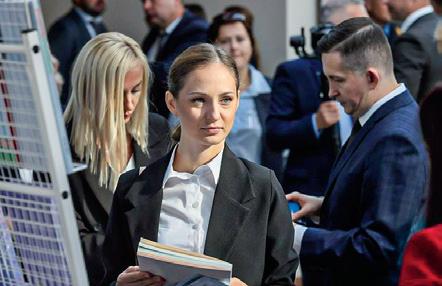
Great attention is paid to education in Belarus

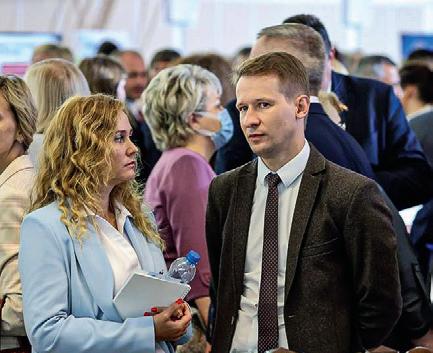
BELTA
BELTA
BELTA
Minister of Education Igor Karpenko, deputy Igor Marzalyuk, representatives of institutions of all forms of education spoke at the meeting dedicated to the prospects of the education system, the Education Code, which is being prepared for adoption in the second reading, directions for improvement of the quality of knowledge, formation of values, teaching, education of young people. After the speeches, the President took the floor.
He noted that the time is an unprecedented challenge for the education system, and the past two years were difficult both for the country and the education system. There were many trials – the pandemic, which created stressful conditions and forced the educational process to be rebuilt along the way, and political events that affected educators as much as law enforcement and government officials. "And today I thank you, who did not hesitate, and repsented by you our entire pedagogical community for professionalism, dedication and civic position, which, believe me, a lot depended on. You did everything for our children to learn when we knew nothing about the virus and it was scary to go to work. I know that you were threatened when the riots broke out, especially in Minsk. In the face of persecution, you boldly did your job: taught, educated, patiently communicated with aggressive parents," – said Alexander Lukashenko.
The President noted that he knows how the teachers managed to keep teenagers from unlawful actions, how they sometimes had to seize them by the hand. According to the head of state, they reaffirmed that education is not a service sector, not a business, but a stronghold of our statehood, a socially significant branch of the economy. "The lessons have been learned. The
events that had taken place predetermined the global nature of the questions that we brought to this pedagogical meeting. We need to reset the education system. Today it is a matter of national importance. More than two hundred years ago it was wisely said: school is second to bread for people. Without deminishing the role of the family, we all understand that it is the teacher who is at the origins of the formation of the people as a single nation. Science calls this national identity. It's just patriotism," – the President stressed.
This concept, he adds, includes many meanings – love for the Motherland, respect for the achievements of the past and adherence to traditions, respect for the older generations and pride in the success of contemporaries, the desire to contribute to the history of the country.
War of values and the struggle for patriotism
According to Alexander Lukashenko, the world is waging a war for values, including the classical education system (based on content and methodology), equal access to knowledge, a sought-after profession and a guaranteed first job.
The members of the pedagogical meeting specified new issues to be addressed. The President singled out the most important of them, which are directly related to ensuring the national security of the state. "Recent events have forced to pay attention to one of the main functions of the educational process – upbringing. Let me tell you right away: there are no serious, untenable problems. All this talk about us overlooking young people, the minister insists that this is only demagoguery, I can’t say that, butit is very close, I think. Young people at all times have been rebels, sometimes radical, but mostly constructive, – the head of state says. – However, last year objectively showed us that there are prerequisites that can lead to irreparable consequences. The fewer there are those who were brought up on the values of the Soviet era, the more sharply we feel this. In a sense, we are paying for the reforms of the 90s. External forces have played a significant role in many processes."
According to the President, the global task of the educational community is to find and fill the gaps in the educational process, honestly admit where we have failed, roll up our sleeves and do everything so as not to be afraid to hand over the country to those who will leave school, college or university tomorrow. "The question that is in the air today, is as follows: should the school participate in the political life of the country? The answer is simple: the school cannot be outside politics. But there should be only one policy – the state. State flag and anthem. And let's stop talking about it. This is happening in all self-respecting countries, from the United States to China, including fraternal Russia," – the head of state said.
According to the President, the foundations of any policy are laid at school, and only a patriot can educate a patriot. "Why am I asking this question? Because some of our young people who have received education here want to go abroad. Not all, but the trend is alarming. In the end, those who leave are cut off from their roots. It is good if you go for new experience or knowledge to apply it at home. And then you need to take a closer look at who and what they are taught there. I once instructed the Minister of Education to deal with those who are leaving (we have experience)... – said Alexander Lukashenko and noticed that many of them were on the other side of the barricades during the rallies.
The President also stressed: if you are leaving to study abroad, stay there. "They don't teach well there. They are much inferior to our education. They brainwash them and push them to us as agents. These are ideological, if not enemies, but opponents of our state. And we have to fight them, it’s already difficult to educate them," – the head of state noted.
He added that promising students graduate from educational establishments, high-class professionals who are appreciated abroad, and the quality of knowledge and competencies are beyond praise. The head of state highly appreciated the process of teaching our youth. "And what assessment do we give to the patriotic upbringing of children? The facts say that we probably will not reach 10. But all our last year's events are our school fails," – said Alexander Lukashenko.
Separately, the head of state dwelled on last year's events and the role of teachers in them. "Last year, not everyone understood some of the issues. And we patiently showed what sort of country we can lose if we do not appreciate what we have created over the last quarter of a century," – he said. According to Alexander Lukashenko, serious shortcomings were revealvd at higher educational institutions. "I had to meet with a group of students at the Belarusian State University, we broadcast it to other universities, and the next day not a single student took to the streets. We just forgot to speak with students in simple, understandable language. As a teacher, I do not understand people who come to the class-room for appearance’s sake. Now we are making a new program for communication with people," – he said.
Alexander Lukashenko
Educational tandem of school and parents
The President quoted Sukhomlinsky: if a person chooses the profession of a teacher, he/she must give his/her whole heart to the children. And it doesn't matter who and how got into the profession. "A real teacher will never split responsibility for a child between the school and the family. He/she will involve parents in the process, make them allies during training. And what is happening today will not disappear. Some parents suddenly decided that they could look at the educational process and the upbringing of their child from the
outside, – emphasizes the head of state. – I want to say the following: from the President of the country to a nanny in the kindergarten, we all – society, school, parents – are responsible for the moral and spiritual development of children. There can be no other options."
He praised the importance of the parenting universities project and advised to extend this practice to the entire system – to involve parents who are used to sorting out relationships with teachers, to allow them to attend thematic meetings
and start working with them at school in tandem. "The attitude to the teacher and learning, – everything is formed there. A child will always feel comfortable both in the kindergarten and at school, if the parents initially have a positive attitude towards teachers. But before demanding anything from the teacher, let the parents first ask themselves what they did for the school, where their child sometimes spends more time than at home. That is, what they did for their child," – the President says.
This requires treating the school as a temple of knowledge, and the order and discipline therein depend on teachers. "Put schools in order, whatever the cost. And you will see that in a year or two the school will be different, and the status of the teacher will be different. Moreover,I would say: use any methods, but put things in order at schools," – said Alexander Lukashenko.
One of the problems, in his opinion, is bureaucracy and paperwork. "Let's put things in order at schools so that there is discipline. A teacher should come to school with the thought of educating children so that they reach after knowledge. And don't let them nudge you. You are the managers of the school and be the managers," – Alexander Lukashenko addressed the teachers.
The President drew attention to the safety of children on the Internet. "Everything that happens there, of course, is virtual, not real life. But the consequences of such phenomena as bullying, trolling, grooming and other threats are quite real. I repeat: everyone is responsible. If, God forbid, a child is bullied in networks and in real rela-tionships, then questions arise to the parents whose children behave inappropriately, and to the class teacher who is responsible for the psychological climate in the team," – said the head of state. According to the head of state, more time should be dedicated to relationships with children outside school. "Take the sixth day at school more seriously. If it is filled with sports and cultural events, including together with parents, if everything is organized in an interesting and emotional way, the school and the family will team up," – the President added.
He did not neglect the topic of a teacher’s status. According to him, everyone is interested in the teacher's status to be indisputable in the eyes of pupils, parents and society. "From January 1, 2022, we must find an opportunity to significantly stimulate the work of class teachers and curators of groups of professional and secondary specialized educational institutions. I instruct the Government to make relevant proposals in the near future. Think and let us know how we can support preschool teachers. Their work and the work of their assistants is no less difficult and important," – Alexander Lukashenko is sure.
Alexander Lukashenko drew attention to the content of the school curriculum.
According to him, in the history of independent Belarus, school textbooks are regularly updated. "I just paid attention to it. Some Soviet textbooks have been reprinted for more than twenty times. They were awarded the State Prize. They are written in a bright lively language, with regard to the age characteristics of schoolchildren. They were consistent, logical and fascinating. Their content had a pronounced educational component. And today?" – he stressed. According to the President, there are still many complaints about modern textbooks, including from teachers. He stated that this should not be the case and that experiments with textbooks should be stopped. "And I urge you, including teachers. Recollect what has been written, and then let's report back. The teacher and the textbook are the main things," – the head of state addressed those present. The Belarusian leader noted that the textbook was and will be the main working tool of the teacher, despite the rapid development of electronic educational resources. "Of course, we will use the elements of distance learning, introduce them into the educational Great interest of teachers is the main mood that prevailed on the forum process. This is an objective necessity. However, I want to warn you. Digital opportunities should serve educational but not entertaining purposes. The teacher is not a blogger, youtuber or information animator. It is a matter of vocational aptitude and image. By the way, the status too," –he said. Alexander Lukashenko specifically dwelled on textbooks on the humanities – history and social studies. "It's time to put an end to the assessment of historical eras and personalities. We must determine those who are heros, historical persons, and those who are people’s traitors," – he said. The President recalled a conversation with students-historians on July 3 at the Mound of Glory. They told him that they were carried away by the theme of the Great Patriotic War and took the initiative to make a textbook on the war that would be of interest to young people. "I hope that in the new textbook, taking into account the revealed facts, the main emphasis will be placed on the genocide of the Belarusian people, on cooperation and other topical issues we didn’t use to speak much. There is no doubt that it is necessary to more actively involve young people, students, graduate students, and novice scientists in such
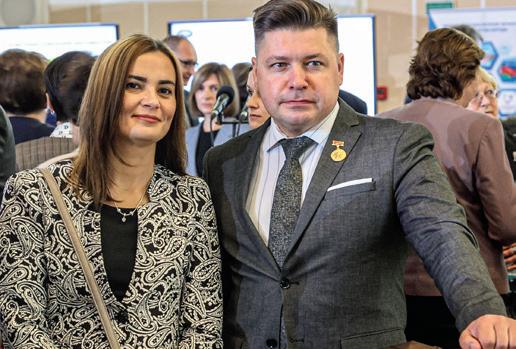
activities. Consider their opinion, their vision. Let them argue, let them defend their point of view. This is fine. Everyone will benefit from it," – the head of state is sure.
Tough competition is inevitable
According to the head of state, an equally important task is to train specialists for the economy, which universities, colleges and vocational schools are responsible for. "One of the criteria for work efficiency is competitiveness. Educational institutions, their employees and teachers. We see how quickly production methods, the structure of the economy, and labor markets are changing. This is a serious challenge for the vocational education system. There is an administrative mechanism for solving this problem. The Ministry of Economy and the Ministry of Labor should make forecasts in advance for the professions demanded by the time and our economy, and form an order for the Ministry of Education. But what do we see in practice, especially when we open new enterprises? There is a lack of staff," – the President said.
According to Alexander Lukashenko, everything starts from school, from good career guidance councelling. "To what extent do we really help our children to understand their mission, to decide on a profession that will become the career for lifetime? To what extent do our enterprises and HR personnel take part in this process?" – he asked.
The President explained why he focused on issues that had been discussed a million times. "So far, we have been witnessing a frantic race for higher education degrees. Children receive them, and then, as it is in to say now, they are looking for their place in the world all their lives. Either the salary is not good, or the status, or it is too far away, and so on. Parents and children still underestimate the prestige of blue-collar jobs and the level of training of such specialists," – he said. Alexander Lukashenko noted that young people studying in technical schools are not inferior in their competencies to university students. And they are happy with their choice. According to him, the country's economy is based on such specialists. And the strategic task is to raise the prestige of these professions. "Everyone knows that a better form of providing a government order than a targeted matriculation has not been invented so far. This form of work has paid off completely. There is an instruction to the heads of industrial enterprises, agricultural organizations, branches of the economy to expand it. Moreover, customers shouldn't have any problems with choosing a university for training," – said Alexander Lukashenko. He also noted that there are 50 higher educational institutions in Belarus. In terms of territory and population (Switzerland, Denmark, Finland, Israel) the number of universities is 2-3 times less. This suggests
that fierce competition is inevitable between the institutions themselves for the training of specialists necessary for the economy. "You will be on the top of progress, if you give the country scientists, engineers, designers, and other specialists who know how to create new products and technologies, you will have work. If you fail, you will be subject to natural selection," – Alexander Lukashenko assured.
Alexander Lukashenko
"We will dedicate the next year to education"
According to the President, it will be necessary to resolve fundamental issues on which the success of the educational process depends. Many of them are already reflected in the new edition of the Education Code. The head of state instructed to develop a standard that would establish requirements for the organization of lessons, observing school etiquette and the dress-code of pupils and teachers. "And all participants in the educational process will have to unconditionally comply with the provisions of this document. This was done in order to remove all controversial moments or misunderstandings between the family and the school," – the Belarusian leader said.
Alexander Lukashenko stressed that all the proposals submitted to the pedagogical meeting will be sumed up. There is a year to solve the problem. "We know how to do everything: save lives, perform heroic deeds, solve economic problems. These are you – teachers and university professors. But the drawbacks, fails of our life are also you. Therefore, let's reduce these fails and we will work in this direction," – the President said.
The Belarusian leader stressed that next year will be dedicated to education. And during this period it will be necessary to take into account everything – from going to a secondary school and the placement of schools, their construction. "Let's be closer to the ground, let's not advance slogans. Let's take a look at ourselves so that children receive a normal education and take root in this life. Everything that depends on us, and on me, and on you, believe me, we will do the best for you. We will give the last penny to the teacher. There is no country without a teacher," – the head of state is sure of this.
The President also noted that people spend a lot of time on their phones. "Sometimes it is disgusting to even look at some civil servants. They see nothing, they go and poke in the phone. And they read what is written there. The headlines mainly convey information, and if you read further, it does not correspond to the heading," – the President said.
The head of state noted that civil servants and the military should be very careful about telephones as a source of information. "Today's world is so dangerous, so terrible – we need to save our country," – the President said. "The world has turned upside down. I told you before the pandemic what would happen after it. You didn't believe me six months ago. And you see what's going on. Americans simply cannot forget about their hegemony. They will cling to their hegemony, because that is their wellbeing".
Maria Dadalka
MINSKNEWS.BY
Presentation of a new Belarusian primer was held in the National Library on the eve of a new school year. For first-graders of Belarusianlanguage educatinoal establishments it started with the new book. The presentation was attended by textbook authors, publishers and experts.
During the presentation it was possible to get acquainted with a book-stand, which contained 30 national primers and publications for primary reading and education from the funds of the National Library.

Book of exceptional value
A great and bright era of its predecessor, the primer by Anatoly Klyshka, which was used for more than half a century: from 1969 to 2021, has come to the end.
As you know, the primer is of exceptional importance. After all, this book opens the way to knowledge, lays the foundations for the personality formation. This and many other things were discussed at the presentation at the National Library, which took place in the famous gallery "Labyrinth", where exhibitions and other events are held. "A new era begins in the history of the Belarusian primer, which itself is very rich, varied and interesting. This is one of the brands of Belarus, a symbol of the pride of our ancestors and us," – said Deputy Director General of the National Library of Belarus Alexander Susha.
The new primer has vivid national content, it contains tasks and exercises
reflecting the cultural values of the Belarusian people.
According to Olga Sviridenko, the author of the modern publication for first-graders, it is based on the best classical methods of teaching reading and writing. "We tried to make the ABC book that can teach children to read. However, we understand that our children live in the information space and use gadgets at the age of two or three. Therefore, the idea arose to show them that the phone can be used not only for games, but also for learning." "This schoolbook accumulates the methodological thought of many generations of Belarusian scientists, – said Valentina Ginchuk, director of the National Institute of Education. We hope that the primer will be interesting, modern and duly appreciated."
It’s interesting, that the schoolbook has an option that allows children to use additional media resources for learning. These are cartoons created by the National Film Studio "Belarusfilm". "The production of films began in 2015, and there has never been such a didactic educational and cognitive material in Belarus," – said cartoonist Konstantin Andrushechkin.
We also learned that publication of new editions would continue. In October an additional book "Primer fellow" is planned to be published. It is intended for those children who already can read. In addition to the text, it contains informational content, i.e. videos about different parts of Belarus. For example, there is a unit "Know your land" where children can read the names of Belarusian cities, rivers and lakes, and then watch a video about Belovezhskaya Pushcha making use of QR codes. Mikhalina Cherkashina
NLB.BY
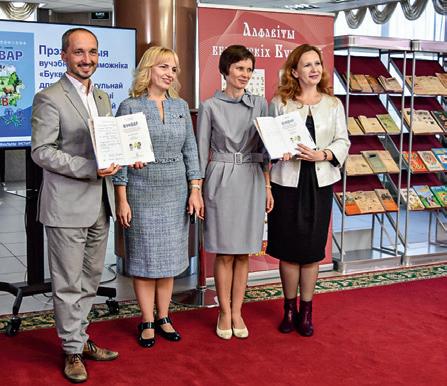
During the presentation
BELTA
Such primer delights children
A new public holiday was celebrated in Belarus on September 17 – the Day of National Unity The day that unites

During the round table at the National History Museum
The sovereignty of Belarus and its national interests are our unshakable priority, said the Chairperson of the Council of the Republic Natalya Kochanova during a round table "The Day of National Unity as a Symbol of Consolidation of the Belarusian People", which was held at the National Historical Museum. The round table was attended by members of the Council of the Republic, the Commissioner for Religious and Ethnic Affairs, representatives of Minsk City Executive Committee, the Academy of Management under the President of Belarus, heads of central mass media, youth.
As we know, proposals to establish this holiday were made in February this year at the 6th All-Belarusian People's Assembly. It was on this day in 1939 – September 17 – that the Red Army launched the Polish campaign, its result was reunification of Western Belarus and the BSSR.
Speaking at the round table, Chairperson of the Council of the Republic Natalya Kochanova clarified: – In the fall of 1939, the Belarusian people, who previously had been forcibly divided for the sake of foreign opportunistic political interests, reunited with the Belarusian Soviet Socialist Republic. The President noted that "the memory of this event lives in the hearts of Belarusians, because it became an act of historical justice for the Belarusian people, divided against their will." That is why September 17 became an important day in the history of the Belarusian state and nation, a kind of starting point for a new milestone of the Belarusian statehood.
The speaker of the upper house of the parliament noted that the Day of National Unity is especially significant for Belarus as a sovereign state that independently determines the path of its historical and socioeconomic development, implements an independent multi-vector foreign

BELTA
policy based on good neighborliness, mutual respect and non-interference in internal affairs. The speaker emphasized: the history of the country is written by the people. "But we should write it truthfully so that after many generations or in a few years – 10, 20, 30, 50 – people could tell the truth about the time we are living in. And we understand how important it is to preserve this historical truth. It is important that the original documents have been preserved today. And we see them at exhibitions that are held throughout the country," – Natalya Kochanova summed up.
The Chairperson of the Council of the Republic stressed that the sovereignty of Belarus and its national interests are an inviolable priority. "But not everyone likes it. Attempts to undermine the situation in the country have been made several times. The events of 2020 have once again demonstrated fragility of peace and order. But we, rallying around our leader, the President, were able to overcome the threats of a color revolution. We have prevented destabilization of state institutions and the collapse of the economy. This date is also a symbol of victory for those who want to see Belarus peaceful, strong and independent. The country's independence depends on each of us. It is our sacred duty to preserve our sovereignty, a calm and constructive life on our land. If we want to live in peace and prosperity, we should do everything possible for the development and prosperity of our native Belarus," – stated Natalya Kochanova.
Round table participants also noted that today strengthening unity of the Belarusian people and achieving public accord are the determining factors for further development of the country, and the preservation of historical memory is a priority task for politicians, scientists, and public figures. All this expresses the morale of the people of Belarus, aimed at solving the most important historical tasks. It was emphasized in the speeches that a consistent state policy is being pursued in the country to strengthen peace and form the spiritual unity of the Belarusian society. "Having comprehensively discussed the topical issues of preserving the historical memory of the events related to the reunification of Western Belarus with the Belarusian Soviet Socialist Republic in 1939, their significance for the consolidation of the Belarusian society and the state, the round table participants consider it appropriate to specify the following: cohesion, solidarity and mutual understanding of Belarusians united by history, traditions, culture and a common spirit of respect and equality, have always been the main values for our people, – the resolution says. – A symbol of the unity of the Belarusian nation, forever entrenched in its historical tradition, is the date of September 17, 1939. On this day, the liberation campaign of the Red Army began, as a result historical justice was restored for the Belarusian people who were divided against their will in 1921 by the terms of Riga Peace Treaty. It is quite natural that the date of September 17 was defined as a public holiday – the Day of National Unity, which should give a powerful boost to activation of the Belarusian memory policy and give it an additional impetus. Today, the Day of National Unity embodies the inviolability of the territorial and ethnic consolidation of the Belarusian nation, the inviolability of our statehood, solidarity and support for the head of state policy on protection of national interests and strengthening of civil harmony."
The participants of the round table appealed to everyone who is not indifferent to the fate of the Motherland, who loves Belarus: to make every effort to preserve the main value – the unity and cohesion of the people, peace and
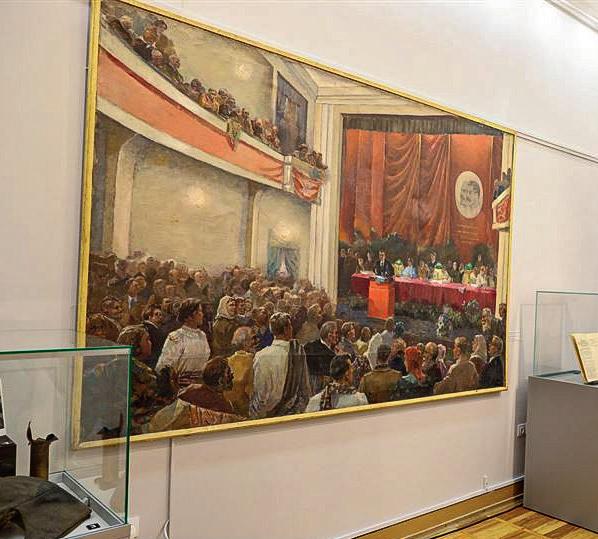
BELTA
quiet on the Belarusian land. "This is the strength of sovereign Belarus and the guarantee of its prosperous future," – the resolution says.
In the modern world, the unity of nations is very important, said Natalya Kochanova, Chairperson of the Council of the Republic, following the round table: – I'm just sure that the Day of National Unity should be such a holiday that will be celebrated not only by modern generations, but also by those generations that will follow us. Because this is our history, our roots. And because in the modern world, the unity of the people, nations, their own sovereign country is very important.
By the way, the work of the round table was preceded by the opening of the thematic exhibition "September 17 – the Day of National Unity". The republican museum project was developed by the National Historical Museum and regional museums. The expositions were presented during the opening ceremony via a teleconference.
On the Day of National Unity, almost all state institutions held various events related to the holiday. So, the National Historical Museum organized a thematic exhibition. Director of the National Historical Museum Aleksandr Khramoy told about the idea of the exhibition: – For the Day of National Unity, our museum has prepared an exhibition project related to the events of the unification of Western Belarus with the BSSR. In 1921, our people were divided by a border that was almost impossible to cross. Our exhibition shows the path of the Belarusian people to unification. These are materials from the press of Western Belarus and the BSSR. Events related to the campaign of the Red Army. And also a reflection of the fate of people who at that time lived on the territory of Belarus, a story about their interfaith and interethnic unity. We talk about the obstacles that the Belarusian people had to overcome on the way to a single nation, single territory. One can also learn about those activists who strived for unification, for example, about the chairperson of the Council of People's Commissars Aleksandr Chervyakov.
Some materials of the exhibition tell about the liberation struggle, which was waged on the territory of Western Belarus, about the activities of the Communist Party of Western Belarus, the Belarusian peasant-workers community, the Communist Youth Union of Western Belarus. Members of these organizations were persecuted and arrested by the then Polish authorities, as evidenced by numerous documents and photographs. A separate showcase is dedicated the famous politician of Western Belarus Sergey Pritytsky. The exhibition displays numerous posters, banners, leaflets, revealing historical milestones of political events of that time in Western Belarus.
Besides, the exhibition presents materials on the life of Belarusian peasants, the Society of the Belarusian School, Culture and Education. Here one can see school textbooks, notebooks, photographs, documents showing that until 1939 there were no schools in Western Belarus with the Belarusian language of instruction for children.
Undoubtedly, the picture, painted by the Belarusian artists Isaac Davidovich and Evgeny Tikhanovich, stands out at the exhibition. It reflects an important event in the history of Belarus – the meeting of the People's Assembly in Bialystok, which legislatively secured the accession of Western Belarus into the BSSR.
Also during the exhibition, there was a presentation of a unique publication of the collector, laureate of the prize "For Spiritual Revival" Vladimir Likhodedov, which had been edited by Zviazda Publishing House with the support of the Ministry of Information of the Republic of Belarus. – It may be difficult for us to imagine how the Belarusian people were forcibly divided into two parts a hundred years


EVGENY PYASETSKY
ago, but after that we did not cease to be one people. Moreover, our compatriots from the western regions had been actively fighting for the right to be Belarusians for almost 20 years. And it is precisely with the most striking episodes of this struggle that one can get acquainted on the pages of the new book by Vladimir Likhodedov, – said the First Deputy Minister of Information Andrei Kuntsevich during the presentation of the publication.
So, the historian and collector Vladimir Likhodedov participated in in the creation of this exhibition together with the National Historical Museum. It was he who provided many things that make up the exposition: – Of course, there are also exhibits from the funds of the National Historical Museum and the National Historical Archives. Among the things that I actually added, I would specify the printing press on which the leaflets were printed. The Belarusian press of 1921-1939, which was published on the territory of Western Belarus, is also presented. It reflects the life of Belarusians of that time, their problems related to the language, recognition of nationality, and the closure of schools. Quite interesting, truthful information, which one can’t find anywhere else except these newspapers. Writing instruments from my collection, which were used by residents of both Western and Eastern Belarus, are also presented at the exhibition. And a unique exposition dedicated to the school of that time: here one can find notebooks, pencils and inkwells. There were Belarusian-language gymnasiums in Poland, but only a few of them. There were not enough of them. The notebooks can help to trace the political situation in the country: 1939 academic year begins – a student writes in Polish. The same notebook in October-November – and there are already notes in a different language.
What is the peculiarity of the Belarusian press of those years, samples of which can also be found at the
But the most important thing is that different Western Belarusian parties, despite diverging political views, had the same opinion on the Belarusian issue – unification.
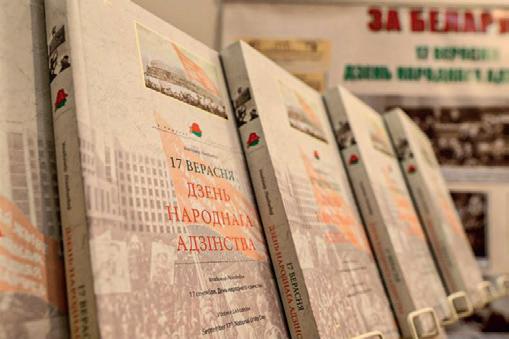
BELTA exhibition? As Vladimir Likhodedov noted, it wrote about the problems associated with education, oppression of Belarusians, Polonization: during the population census, people were called Poles in the column "nationality", although they were Belarusians.
What about censorship? After all, the authorities obviously did not like sensitive issues. Vladimir Likhodedov notes that the Belarusian press was not censored, since its existence was very short. It was simply closed. A year or two, perhaps even less, and a periodical was closed down. In some publishing houses, only a few issues could come out. Naturally, the Polish authorities did not like the truth told by the Belarusian press. Most of those newspapers were published in Belarusian, namely in Cyrillic.

Vladimir Likhodedov
BELTA
Alexander Pimenov



